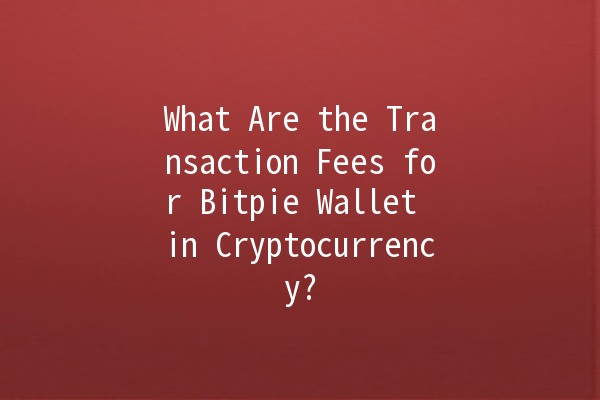
In the world of cryptocurrencies, understanding the cost of transactions is crucial for anyone looking to manage their digital assets effectively. One popular wallet that many users rely on is Bitpie Wallet. In this article, we will delve into the transaction fees associated with Bitpie Wallet, offering practical tips for users to maximize their savings and streamline their operations.
Understanding Bitpie Wallet and Its Features
Bitpie Wallet is a versatile cryptocurrency wallet that supports a myriad of digital currencies. It provides a userfriendly interface and various features that cater to both beginners and experienced traders. Understanding the fees associated with using the wallet can help users make informed decisions about their trading and investment strategies.
What Are Transaction Fees?
Transaction fees are charges incurred when transferring cryptocurrency from one wallet to another. These fees vary depending on several factors, such as network congestion, the type of cryptocurrency being transferred, and the wallet service itself. In the context of Bitpie Wallet, it's essential to know how these fees are structured.
Factors Influencing Transaction Fees

s into Bitpie Wallet Transaction Fees
To give a comprehensive view of transaction fees, we dissect Bitpie Wallet's fee structure as follows:
Sending Cryptocurrency
When sending cryptocurrencies through Bitpie Wallet, users should be aware of the following:
Standard Fees: Bitpie charges a standard fee for transactions. For example, sending Bitcoin may incur a fee of around 0.0005 BTC, depending on network conditions.
Dynamic Fees: Bitpie uses dynamic fees that adjust based on network congestion. If the Bitcoin network is busy, fees may increase to ensure timely transactions.
Example: If a user wants to send 1 BTC during a peak time, they might pay a transaction fee of 0.0007 BTC instead of the usual 0.0005 BTC.
Receiving Cryptocurrency
Receiving funds through Bitpie Wallet typically does not incur charges. However, it's important to note that while receiving funds is often free, the sender may still pay their network's transaction fee.
Exchange Fees
If you use Bitpie Wallet to exchange cryptocurrencies, there may be additional fees involved. These can vary based on the swapping ratio and the type of cryptocurrency being exchanged.
Tips to Minimize Transaction Fees While Using Bitpie Wallet
Tip 1: Choose Optimal Times for Transactions
One effective way to lower transaction fees is to time your transactions during offpeak hours when the network is less congested. This can lead to lower fees due to decreased demand.
Tip 2: Utilize Transaction Fee Estimators
Before initiating a transaction, check online transaction fee estimators. These tools provide realtime fee recommendations based on current network conditions.
Example: If the fee estimation tool suggests sending Bitcoin when the network is less busy, doing so can save you money.
Tip 3: Consolidate Transactions
If you're planning to send multiple transactions, consider consolidating them into a single transaction. This can significantly reduce the total fees paid.
Example: Instead of sending 0.5 BTC to five different users, send 2.5 BTC at once, and include notes for each recipient.
Tip 4: Opt for Lowfee Cryptocurrencies
When possible, choose lowfee cryptocurrencies for transactions. Coins like Stellar (XLM) often have lower transaction costs compared to Bitcoin or Ethereum.
Frequently Asked Questions (FAQs)
Bitpie Wallet calculates transaction fees based on current network conditions, type of cryptocurrency, and whether the fee structure is static or dynamic.
Generally, Bitpie Wallet is transparent about its fees. However, users should be aware of the market fluctuations in cryptocurrency prices, which can indirectly affect perceived fees.
While you cannot completely avoid transaction fees, using strategies like choosing offpeak transaction times or utilizing cryptocurrencies with lower fees can minimize costs.
While there is no set maximum fee, users should be aware of exceedingly high fees during network congestion. Monitoring fee guidelines from Bitpie can provide better insights.
Users can monitor their transaction history in the Bitpie Wallet app, which provides detailed summaries of fees associated with each transaction.
If the transaction fee is set too low during a congested period, your transaction may take longer to be processed or may even fail to confirm.
Understanding the transaction fees in Bitpie Wallet is vital for maximizing your cryptocurrency transactions and overall wallet usage. By implementing smart strategies and being aware of network conditions, users can significantly minimize costs and streamline their trading efforts. For cryptocurrency enthusiasts, keeping these tips in mind will enhance their financial decisionmaking process while navigating the exciting world of digital assets.

